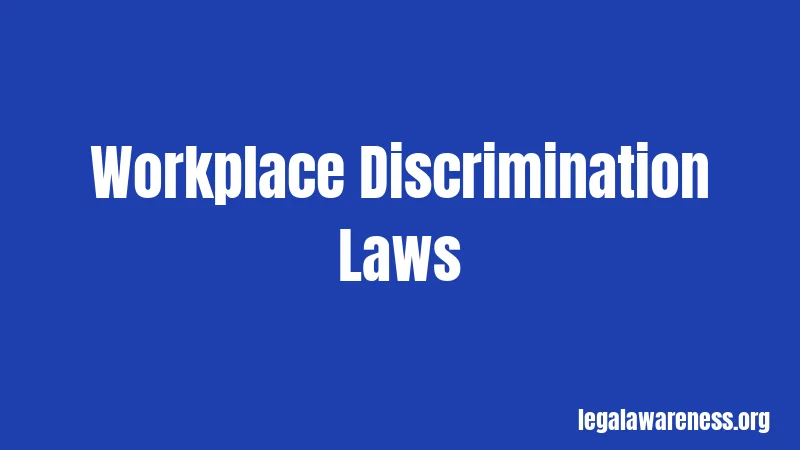Employment Laws in North Carolina (2026): Your Complete Rights Guide
Most people think they’re protected at work. They assume their boss can’t just fire them for no reason. But here’s the thing: North Carolina is an “at-will” employment state. And that changes everything.
If you work in North Carolina, you need to know your rights. The rules might surprise you. Let’s break down exactly what you’re entitled to and what your employer can legally do.
What Is At-Will Employment?

At-will employment means your boss can fire you anytime. They don’t need a good reason. They don’t even need any reason at all.
Seriously. Your employer can let you go because they don’t like your haircut. Or because you remind them of their ex. Or just because it’s Tuesday.
Sound unfair? It gets more complicated.
You also have the right to quit whenever you want. No two weeks’ notice required. But let’s be honest, most people care more about job security than quit flexibility.
Hold on, this part is important. At-will employment doesn’t mean your employer can do anything they want. There are exceptions. And these exceptions matter a lot.
Basic Worker Protections
Minimum Wage and Pay
Right now, North Carolina’s minimum wage is $7.25 per hour. That matches the federal minimum wage. Cities and counties can’t set their own higher rates.
Tipped workers get paid differently. Restaurants can pay servers just $2.13 per hour. But tips must bring total earnings to at least $7.25 per hour. If they don’t, your employer makes up the difference.
Workers under 20 can be paid $4.25 per hour for their first 90 days. After that, they get regular minimum wage.
Overtime Rules
Work over 40 hours weekly? You get overtime at 1.5 times your regular rate.
As of January 1, 2025, workers making $58,656 or more yearly might not get overtime. That’s the exemption threshold. Some jobs are always exempt: executives, administrators, professionals, and outside salespeople. Blue-collar workers always get overtime, regardless of pay.
Breaks and Meal Periods
You’re gonna love this one. Actually, you might not.
North Carolina doesn’t require breaks for workers 16 and older. No lunch breaks. No coffee breaks. Workers under 16 get a 30-minute break after five hours.
If your employer gives you a short break (under 20 minutes), they must pay you. Longer breaks can be unpaid if you’re completely free from work duties.
Workplace Discrimination Laws

Who’s Protected?
Federal and North Carolina laws protect you from discrimination. These apply to employers with 15+ employees. Age discrimination requires 20+ employees.
Protected categories include race, color, religion, sex, pregnancy, national origin, age (40+), disability, genetic information, military service, HIV/AIDS status, sickle cell trait, and using lawful products off-duty.
The North Carolina Equal Employment Practices Act (NCEEPA) covers these protections. But you can’t sue directly under NCEEPA. You file with federal agencies like the EEOC at 1-800-669-4000.
What Counts as Discrimination?
Discrimination happens at any employment stage. Hiring, promotion, pay, benefits, or firing—all protected.
Pay discrimination is illegal. Same work deserves equal pay, regardless of protected characteristics. This includes salary, overtime, vacation, sick pay, insurance, and retirement benefits.
Sexual Harassment
Sexual harassment is sex discrimination. It’s illegal under federal law. Harassment doesn’t require physical contact. Words, jokes, pictures, or repeated unwanted advances all count.
Same-sex harassment is illegal. The harasser doesn’t have to be your supervisor. Co-workers, clients, and customers can create illegal harassment.
You’re not alone, this confuses a lot of people. If it makes you uncomfortable and relates to your sex, it’s probably illegal.
When You Can Be Fired (And When You Can’t)
Legal Reasons for Termination
Your employer can fire you for being late once. For making a mistake. For personality conflicts. For no reason at all. These are legal under at-will employment.
But there are limits. Big ones.
Illegal Reasons for Termination
You cannot be fired for discriminatory reasons. Race, religion, sex, age, disability—all protected.
You cannot be fired for reporting illegal activity. Whistleblower protection covers this.
You cannot be fired for filing workers’ compensation claims. Got hurt at work? That’s protected.
You cannot be fired for taking protected leave. FMLA gives you 12 weeks unpaid leave for certain situations. You need 12 months employment and 1,250 hours worked. Your employer must have 50+ employees within 75 miles.
North Carolina added new family leave in October 2024. You get up to 52 weeks unpaid leave to care for a sick child, parent, or spouse. You can use this within five years.
You cannot be fired for jury duty or military service. These are protected civic duties.
The Retaliatory Employment Discrimination Act
REDA protects you from retaliation for reporting safety violations, wage issues, workers’ comp claims, genetic testing complaints, and National Guard service.
File complaints with the NC Department of Labor’s Retaliatory Employment Discrimination Bureau.
Employment Contracts and Handbooks

Written Contracts
Most employees in North Carolina don’t have written contracts. At-will employment is the default. But if you do have a contract, everything changes.
A written contract can promise job security. It might say you can only be fired for specific reasons. Or that your employer must follow certain steps before firing you.
These contracts override at-will employment. If your employer violates the contract, that’s a breach. You can sue for wrongful termination.
Employee Handbooks
Here’s where things get tricky. Some employee handbooks create contracts. Some don’t.
If your handbook says you’ll only be fired after certain disciplinary steps, that might be a contract. Your employer would have to follow those steps. If they fire you on the first offense, that could be breach of contract.
Many employers avoid this by including language that preserves at-will employment. The handbook says it’s just guidelines, not a binding contract.
Read your handbook carefully. Look for contract language. When in doubt, talk to an employment lawyer.
Noncompete Agreements
Noncompete agreements prevent you from working for competitors. They’re legal in North Carolina. But there are limits.
House Bill 269 proposed banning noncompetes for workers making less than $75,000 a year. This would take effect July 1, 2025. As of now, it’s still being considered by the legislature.
If the bill passes, employers couldn’t stop lower-paid workers from getting jobs with competitors. This would increase job mobility for many North Carolina workers.
Recent Law Changes
2025 Updates You Need to Know
The overtime exemption threshold jumped to $58,656 annually on January 1, 2025. Many workers who were exempt now qualify for overtime.
State jobs got easier to get in July 2025. Governor Stein signed Senate Bill 124. Fewer jobs require degrees. You can use resumes for all applications. Temporary-to-permanent hiring expanded.
The law aims to speed up hiring. Previously, it took 182 days on average to hire a state employee.
Proposed Legislation
Several bills could change employment law. Senate Bills 120/207 would help union organizing. The CROWN Act (SB 154/HB 168) would protect natural hairstyles from discrimination. House Bill 256 would allow public employee bargaining.
House Bill 269 would ban noncompetes for workers earning under $75,000, effective July 1, 2025. These haven’t passed yet.
Child Labor Laws
Basic Requirements
Anyone under 18 is a minor in North Carolina. Minors need a youth employment certificate before working. You get this from the NC Department of Labor’s Wage and Hour Bureau.
Minors under 14 can only work in specific situations. Parent’s business, newspaper delivery, modeling, acting, or theater productions are allowed.
Minors aged 14 to 17 face restrictions. They can’t work in hazardous occupations. Things that risk their health or safety are off-limits.
Work hours for minors are limited too. School-age minors can’t work during school hours. They have restrictions on how late they can work on school nights.
Trust me, this works. The laws protect young workers from exploitation.
Filing Complaints and Getting Help
Where to Report Problems
Think your employer violated wage laws? File a complaint with the North Carolina Department of Labor. They investigate wage and hour violations.
Discrimination or harassment issues? Contact the Equal Employment Opportunity Commission (EEOC) at 1-800-669-4000. You must file within 180 or 300 days of the violation, depending on the type of claim.
After filing with the EEOC, you can request a “right-to-sue letter.” This lets you file a lawsuit in court. You have 90 days after getting the letter to file. The lawsuit must typically be filed within two years of the discriminatory act.
Retaliation claims go to the NC Department of Labor’s Retaliatory Employment Discrimination Bureau. They handle REDA violations.
Getting Legal Help
Employment law is complicated. Seriously complicated. If you think your rights were violated, talk to a lawyer.
Can’t afford a lawyer? Contact North Carolina Legal Aid Services. Their central office in Raleigh is at 919-856-2564. They can connect you with local offices that provide free legal help.
Need a referral? Try the North Carolina Lawyer Referral Service at 919-677-8574. They’ll connect you with attorneys in your area.
Don’t worry, we’ll break this down step by step. First, gather evidence. Emails, text messages, witness names, dates—collect everything. Then contact a lawyer or the appropriate agency.
Unemployment Benefits
When You Qualify
Got fired? You might still get unemployment benefits. It depends on why you were terminated.
If your employer fires you for lack of skill or during layoffs, you qualify. If you quit for good cause (like harassment or unsafe conditions), you might qualify too.
But if you’re fired for misconduct, you won’t get benefits. What counts as misconduct?
Violating drug policies, lying on your application, stealing company property, repeated tardiness after warnings, or violating anti-harassment laws all qualify as misconduct.
You have to be unemployed through no fault of your own. And you must meet wage requirements from your previous employment.
How to Apply
File your claim online through the North Carolina Division of Employment Security. Do this as soon as possible after losing your job. There are deadlines.
You’ll need information about your previous employer. Dates of employment, reason for separation, and wage information all help.
Benefits typically last up to 12 weeks in North Carolina. The amount depends on your previous earnings.
What Employers Must Post
Required Workplace Posters
North Carolina employers must display certain posters. These inform employees of their rights. All posters must be in conspicuous locations where employees can read them.
Required posters include:
North Carolina Minimum Wage and OSHA information, workers’ compensation notices, unemployment insurance information, equal employment opportunity laws, and federal Fair Labor Standards Act (FLSA) information.
The EEOC poster was updated in June 2023. It now includes the Pregnant Workers Fairness Act (PWFA). The federal minimum wage poster was updated in May 2023 with the PUMP for Nursing Mothers Act.
Employers with 15 or more employees need discrimination posters. All employers need wage and hour posters.
Most people don’t realize how strict these posting requirements are. Failure to post can result in fines. It also makes it harder for employees to know their rights.
Special Protections
Pregnancy and Nursing
The Pregnant Workers Fairness Act (PWFA) requires reasonable accommodations for pregnancy and childbirth. The PUMP for Nursing Mothers Act requires break time and private space (not a bathroom) for nursing employees.
Domestic Violence and Genetic Information
You cannot be fired for getting a protective order or being a victim of domestic violence. Employers also cannot discriminate based on genetic information, including sickle cell trait.
Frequently Asked Questions
Can my employer fire me for any reason in North Carolina?
Basically, yes. North Carolina is an at-will employment state. Your employer can fire you for any reason that’s not illegal. But they can’t fire you for discriminatory reasons, retaliation, or reasons that violate public policy or a contract.
Do I have to give two weeks’ notice when I quit?
No. At-will employment works both ways. You can quit anytime without notice. But giving notice is professional and helps maintain good relationships. Some contracts might require notice.
What should I do if I think I was discriminated against at work?
Document everything. Save emails, texts, and write down what happened with dates and witnesses. Report it to your employer’s HR department. Then file a complaint with the EEOC within 180-300 days. Consider talking to an employment lawyer.
Am I entitled to breaks during my work shift?
Only if you’re under 16. Workers 16 and older have no legal right to breaks in North Carolina. If your employer gives you a break under 20 minutes, they must pay you for it. Longer breaks can be unpaid.
Can my employer make me sign a noncompete agreement?
Currently, yes. But House Bill 269 might change this for workers earning under $75,000 per year. The bill is still being considered. If it passes, it takes effect July 1, 2025.
What’s the difference between getting fired and laid off for unemployment purposes?
Getting fired for misconduct disqualifies you from unemployment. Layoffs due to business reasons qualify you for benefits. Getting fired for poor performance (not misconduct) might still qualify you for unemployment.
How long do I have to file a discrimination complaint?
You must file with the EEOC within 180 days of the discrimination. In some cases, you have up to 300 days. Don’t wait. File as soon as possible to protect your rights.
Can I be fired for talking about my salary with coworkers?
No. The National Labor Relations Act protects your right to discuss wages. North Carolina’s Wage and Hour Act also gives you this right. Firing you for this is illegal retaliation.
Final Thoughts
Employment law in North Carolina can feel overwhelming. At-will employment gives employers a lot of power. But you still have important protections.
Know your rights. Document problems when they happen. Report violations to the appropriate agencies. And don’t be afraid to get legal help when you need it.
Most employers follow the law. But when they don’t, North Carolina provides ways to fight back. Stay informed, stay safe, and when in doubt, look it up or ask a lawyer.
Remember: just because you can be fired for almost any reason doesn’t mean you can be fired for illegal reasons. That difference matters.
References
- North Carolina Employment Laws – Employment Law Handbook
- North Carolina Department of Labor – Employment at Will
- Equal Employment Opportunity Commission
- North Carolina General Statutes – Equal Employment Practices Act
- North Carolina Justice Center – At-Will Employment and Wrongful Termination
- U.S. Department of Labor – Fair Labor Standards Act
- North Carolina Office of State Human Resources – Session Law 2025-34
- North Carolina General Assembly – 2025 Legislative Session
